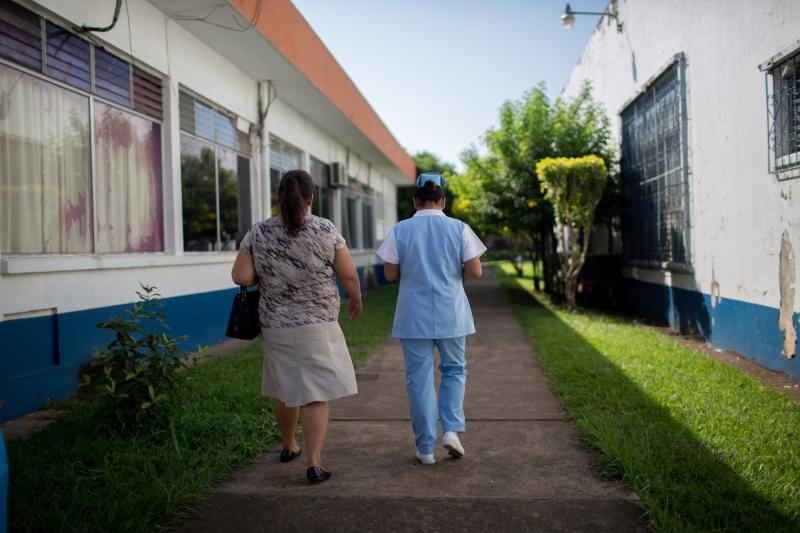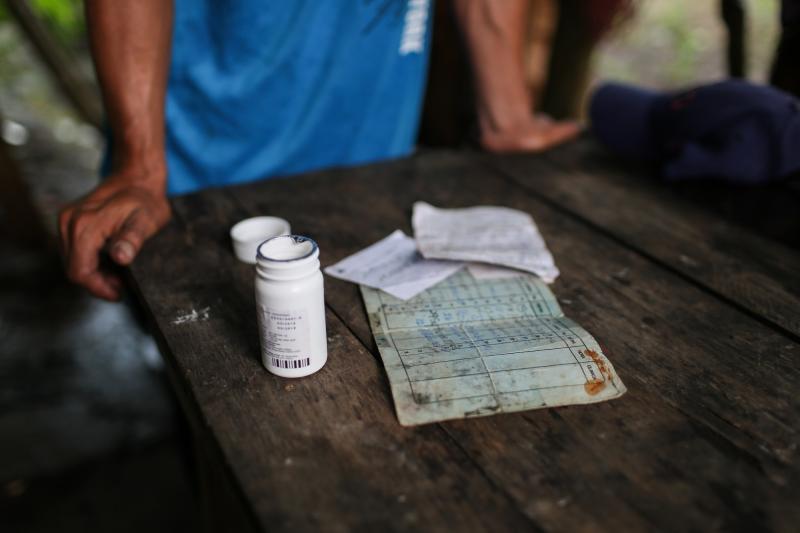Where We Work
See our interactive map


A nurse takes escorts a client to health services in Guatemala. Photo by Anna Watts for IntraHealth International.
Here's how Fabricio, Eliana, and Ann Karina are keeping their clients safe and healthy.
Since the COVID-19 pandemic started, health workers in Central America have been working to ensure all people living with HIV have access to health care. In their communities throughout the region, they’re delivering medicines and adapting to new ways of providing services to the most vulnerable populations during the pandemic.
Here’s how.
Pedro (not his real name) is a university student, who, according to his medical record, lives in Alotenango in the Guatemalan district of Sacatepéquez, 14 kilometers from the Hermano Pedro de Betancourt Hospital HIV Clinic (UAI).
The clinic provides services for people living with HIV in Sacatepéquez and its surrounding areas, such as Guatemala City, Escuintla, and Chimaltenango. When health workers at UAI noticed that Pedro wasn’t attending his appointments, they called him to find out why and check up on his health. This is one of the ways community liaisons at the clinic bring back clients who have been lost to follow-up or abandoned their treatment during the pandemic.
But their phone calls to Pedro were unsuccessful. When health workers couldn’t reach him over the phone, they coordinated with Fabricio, a community liaison, to conduct a home visit.
"I no longer live in Alotenango,” Pedro explained when Fabricio tracked him down. “I was fired from my job and had to move to Escuintla"—92 kilometers from UAI. "It has been difficult for me to return to UAI because of money problems and the distance. Also, the idea that I could be rejected for having been absent for several months made me feel bad."
"I told him that they would be excited to see Pedro again,” Fabricio says. “They were not going to scold or discriminate against him. For him to feel more comfortable, we promised to accompany him to reengage with the clinic. We also offered him the transfer from UAI to a clinic closer to his home."
Through awareness, sensitization, and emotional support, Fabricio was able to reengage Pedro with the HIV clinic, where he’s now getting the care he needs to suppress his HIV viral load and stay healthy.
This is just one of the ways USAID's HIV Care and Treatment Project (HCTP), led by IntraHealth International, is helping health workers reach more clients with high-quality, stigma-free care. Here’s another:

A health worker in Guatemala visits a client's home to deliver medicine. Photo by Anna Watts for IntraHealth International.
Picking up medicine in El Salvador became impossible for some people due to the mobility restrictions imposed by the government during COVID-19. So health workers have been delivering antiretroviral treatment to clients’ homes.
“It is essential that clients have access to medicines during the pandemic so that they do not interrupt their treatment,” says William Hernández, Entre Amigos Association director in El Salvador. Entre Amigos Association is a nonprofit member of HCTP that works to deliver antiretroviral treatment to clients’ homes in San Salvador, particularly for key populations—including sex workers and LGTBI individuals. They defend the human rights of the LGTBI population and work to prevent HIV transmission in the country.
Entre Amigos was so successful at these home deliveries that they caught the attention of the National Sextually Transmitted Infections/HIV Program, which requested their support to expand home deliveries. In February 2021, the HIV clinics at the Rosales, Soyapango, Sonsonate, and Saldaña National Hospital delivered antiretroviral treatment to 1,557 users.
“People are relieved because, despite the lack of transportation and the fear of COVID-19, they can keep taking their medications,” says Eliana Hernández, the community liaison for Entre Amigos. “With our support, they are committed to staying healthy.”
When 25-year-old John (not his real name) visited the HIV clinic at the Torrijos Carter Hospital in Panama for the first time, he was afraid. He didn’t know what to expect or whether he could trust the health workers there.
The fear diminished when he met an adherence promoter, Ann Karina. Ann Karina is part of the USAID HCTP team that has supported the clinic since 2018.
“John was in a vulnerable moment,” Ann Karina says. “His viral load levels—the amount of virus present in his blood—were high, and his defenses were low.”
Ann Karina is a key component in John’s adherence to his treatment. She accompanies him to all his HIV clinic visits.
"Her support has been unconditional,” John says. “You can feel her soul in each of the things she does for you.”
Ann Karina stays connected to her clients through WhatsApp messaging, a quick and approachable method she uses to provide them with counseling.
“Today I am fully healthy, thanks to her great work,” John says. “She does not treat us as patients, but as family.”
IntraHealth International’s HIV Care and Treatment Project in El Salvador, Honduras, Panama, and Guatemala, is funded by USAID. It focuses on reaching clients with high-quality, stigma-free HIV services and works together to enroll and retain as many people living with HIV as possible on treatment.
Get the latest updates from the blog and eNews




